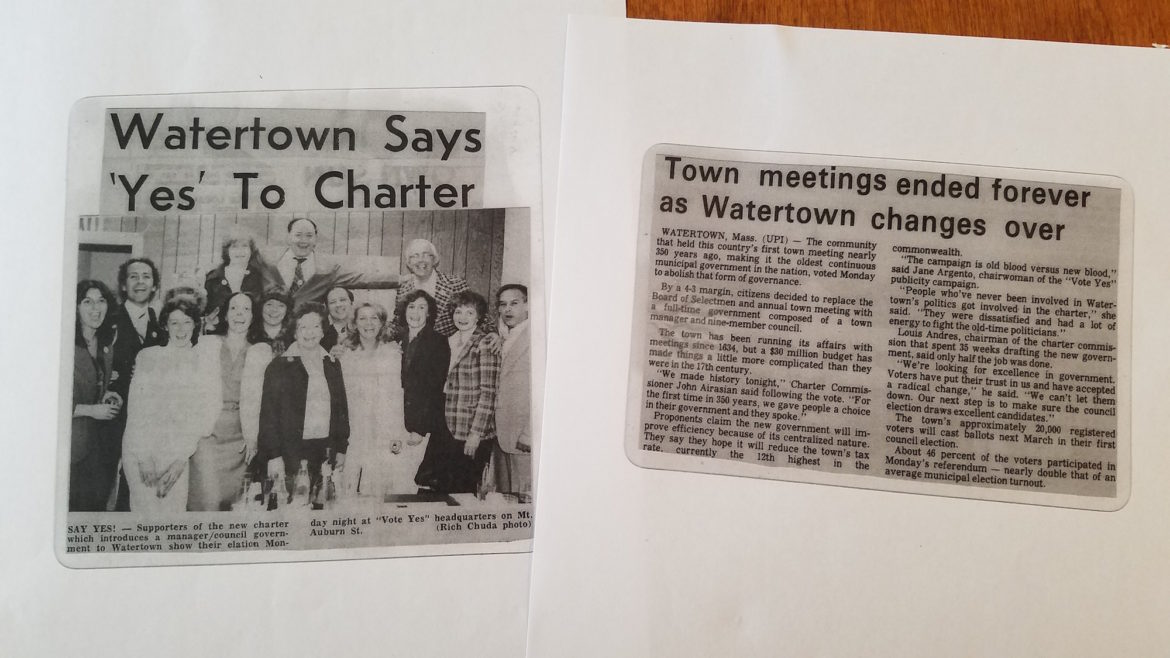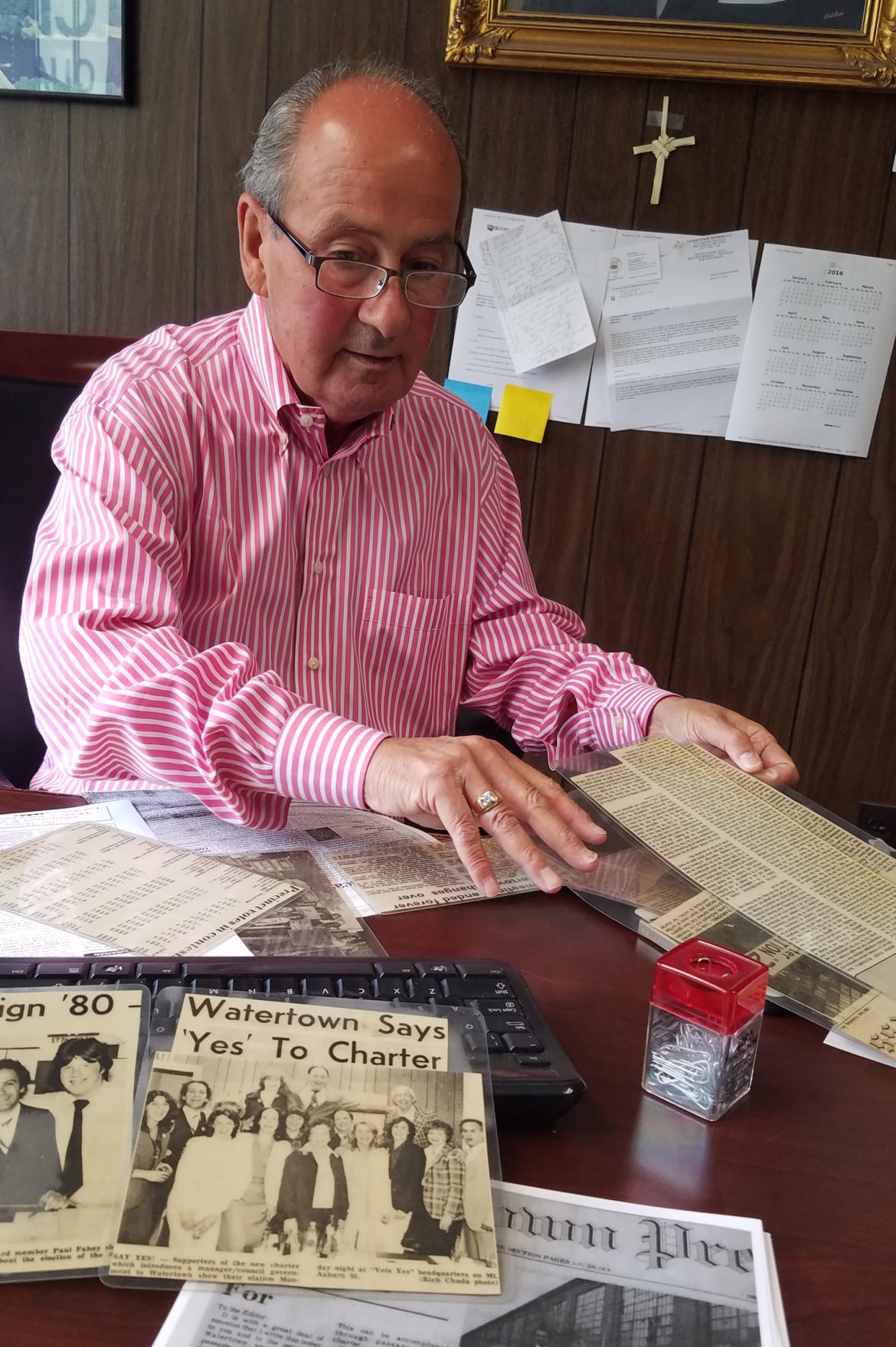
Charlie Breitrose
Newspaper clippings from the day Watertown voted to end Town Meeting and choose a new form of government. John Airasian, one of the leaders of the Yes campaign, can be seen second from the left.
Thirty-five years ago Watertown voters made an earth shifting decision to completely changed the way the town is run and likely put it on course for some of the changes seen today. In 1980 the town voted to become a city, at least in form of government, if not in name.
The new government took effect on 35 years ago today: July 1, 1981. Known as a city form of government, with a Town Council and a town manager, it brought in professional management and sped up decision making. Some say it took away some of resident’s voice and power in town issues.
Town Meeting
In the 1970s, Watertown used the form of government seen in many towns around Massachusetts – town meeting. It is one of the oldest forms of government in the United States, and Watertown was one of the longest practitioners having held its first one in 1634 – predating the United States by more than 140 years.
Some town meetings remain open to all residents to attend and vote on the town’s legislation. Watertown, however, had moved to a representative town meeting, where members were elected to serve the people of their precinct.
Some in town felt that the town meeting had become too dominated by personal politics. They worried that employees of the town and their family members dominated Town Meeting.
John Airaisan, one of the major supporters of the change, said many Town Meeting seats were not contested during elections. Those elected did not always show up during the multi-evening Town Meetings, said Clyde Younger, who served on the School Committee and went on to twice serve as Town Council President.
“There was a sense that once warrant articles were passed for pay raises (for town employees), it was left for the non-public employees to deal with zoning articles and other articles that came up in Town Meeting,” Younger said.
Some town hall jobs and boards were elected, including treasurer/collector and the Planning Board.
To change the form of government, a town charter had to be adopted. Those pushing for the change wanted to see the town more professionally run because running a town had become so complex. Airasian said he also believed the town was missing out on state and local grants because of the way Watertown’s government worked.
“We wanted a government that was accountable, professionally run and less political,” Airasian said.
The Campaign
The change did not come overnight. It took years, Airasian said, to get on the ballot. Some of the key players behind the push for a town charter were town hall employees who quit to lead the effort. Airasian points to Louis Andrews, who left his position as town personnel director and would go on to become the first Town Council President; and Phillip Pane, who quit as town treasurer and had been a selectman chairman and became a Council Vice President. (Pane also was the youngest elected official in town history when he won a Planning Board seat at age 21).
A Charter Commission formed to draft the new form of government. The voters selected nine members members: Airasian, Andrews, Marilyn Petitto Devaney, Robert Ford, Richard Mastrangelo, Brian McDonald, Joseph O’Reilly Jr., Pasquale Sclafani and Younger.
The group met every week for 35 weeks, Airaisan said. The group looked at many forms of government and three were considered: remaining Town Meeting, having a Town Council with an elected mayor, or having a Town Council with a strong Town Manager, who was unelected, said Younger, who went on to serve twice as Town Council President.
The vote was close, Airasian said, but the strong town manager won 5-4, with two favoring a mayor and two wanting to keep Town Meeting.
Another close vote, Younger said, was whether to have the Council President also sit on the School Committee. He favored it because the person would then know the workings of both the school and municipal sides of the government. The group voted 5-4 to have the President sit on the School Committee, Younger said.

Charlie Breitrose
John Airasian looks through his press clippings from the Watertown Charter effort in his office at Eastern Clothing.
The Town Vote
In April 1980, the change was put to the voters. The “Yes” campaign, to change the form of government, had many people in its committee, including Sandy MacDonald, Ron Ohanian, Andrews, Airasian, Jane Argento, Vin Byrne, Paul Fahey, Peter and Jane Sullo, David Choate, Younger and Ford, according to an article from the Watertown Press at the time of the election.
The “No” campaign was lead by Mal Whitney, Tom McDermott, Mastrangelo and Jack McCarthy, the article said.
Late efforts were made by opponents of the Charter to try to alter the existing form of government, which had a three member Board of Selectmen. As an alternative, they suggested hiring an Executive Secretary to help run the town, but with selectmen holding the ultimate power.
When the ballots were counted, they Yes campaign got 54 percent of the vote, winning 4,753 to 3,647 (with 422 blank ballots). About 40 percent of voters came out for that election, Airasian recalls.
The charter was approved, and 350 years after it was founded Watertown became a city (it’s official name is the City Known as the Town of Watertown). See a copy of the first charter here.
The Results
No one is a bigger fan of the new form of government than Airasian. As an example of the way Watertown’s government worked pre- and post-charter, he points to the redevelopment of the two halves of the former U.S. Army Arsenal.
The first section, where the Arsenal Mall is now located, took many years to redevelop under the guidance of the Watertown Redevelopment Committee, which was elected by residents. Airasian said political and personal issues got in the way.
“It went on for 13 years,” Airasian said. “In the meantime windows were broken, copper was stripped.” He added there were legal issues as well.
When it came time to redevelop the part of the complex now known as the Arsenal on the Charles, a group appointed by the Town Manager ran the show. Airasian was appointed Chair of the Arsenal Reuse Committee by then-Town Manager Rodney Irwin.
The group interviewed a slew of developers, and had Boston Scientific very interested in the property when they got the high bid from O’Neill Properties from Philadelphia. Airasian added that when O’Neill turned around and sold the Arsenal on the Charles to Harvard, the town worked out an agreement that Harvard would pay some taxes as well as sign a Payment in Lieu of Taxes (PILOT).
“It was so good that when athenahealth bought it from Harvard, they ended up paying $700,000 less in taxes than what we were getting (combined taxes and PILOT funds) from Harvard,” Airasian said.
Not everyone is as enthusiastic as Airasian, however. Ask Marilyn Petitto Devaney, the former Town Meeting member, longtime Town Councilor and current Governor’s Councilor, about the switch away from Town Meeting and she will say it was the beginning of the town’s downfall.
In March, when the Town Council passed the zoning changes in the Regional Mixed Use District which open the way for the redevelopment of the Arsenal Mall, Petitto Devaney said, “This would have never happened with Town Meeting. It’s so sad what has happened to my town.”
She also said the redevelopment of the Westside of town with large apartment buildings would not have passed muster with Town Meeting.
Pettito Devaney argues that boards such as the Planning Board were more accountable when people were elected, not appointed by the Town Manager and approved by Town Council.
Younger said that the government has not turned out the way he envisioned it. While the Town Council makes the ultimate decision, the Town Manager makes the recommendations.
“I thought the Council would be a more dominant player,” Younger said. “But the reverse has occurred. Most of the decision making power now lies with the Town Manager. It probably depends on who is there as President.”
Airasian said he is a fan of current Town Manager Michael Driscoll, and the Town Council. Things are not perfect, he said, he worries about the impact of the current development boom (particularly traffic) and does not always think that Watertown should follow in Cambridge and Somerville’s footsteps on every issue. Overall, Airasian said he thinks the town is now in great shape financially, and has improved greatly over the years.
He points to the town’s good financial state – a AAA bond rating from Standard & Poor’s and the fact that while neighboring towns routinely have overrides Watertown has not had an operational override since Proposition 2 1/2 passed. Watertown has also built several new buildings – the library, Police Station, Public Works facility, Fire Station, the Senior Center – as well as upgrading the parks and renovated the schools. Also, municipal employees’ pay is on par or better than other community.
“Watertown used to be working class and poo poo-ed by other towns,” Airasian said. “Now all those people are coming to use our library, to use our track. They are coming from Belmont and Newton. No one has improved as much as we have.”
Thanks for this terrific, important and timely reminder. It raises issues about checks and balances of power, responsive government, citizen involvement and civic resoonsibilities. One indeed, however, why only 40% of voters turned out. That is perhaps the most important issue of all especially as we mark Independence Day.
Well said. As the daughter of a capital-city mayor (Michigan) I’ve several reasons for preferring that form of municipal governance. I love living here, yet fear planning and development have run amok without consideration as to the impact on infrastructure and quality of life. There are few checks and balances.
I remember those days of promoting the Charter.
How can it possibly be 35 years ago? Remembering how hard we worked to make it happen. As a promoter, I remember making some huge signs and graphics for the campaign. Thank you John Airasian for saving these photos and press articles, and for sharing them us 35 years later.
I noticed myself at the far left of the photo, and it triggered some memories.
This article tells the story.and the rest is History.
Wow this article was 5 years ago and the Charter battle was over four decades ago! I was very proud to be part of the pro-Charter campaign then, and the results have served Watertown well.